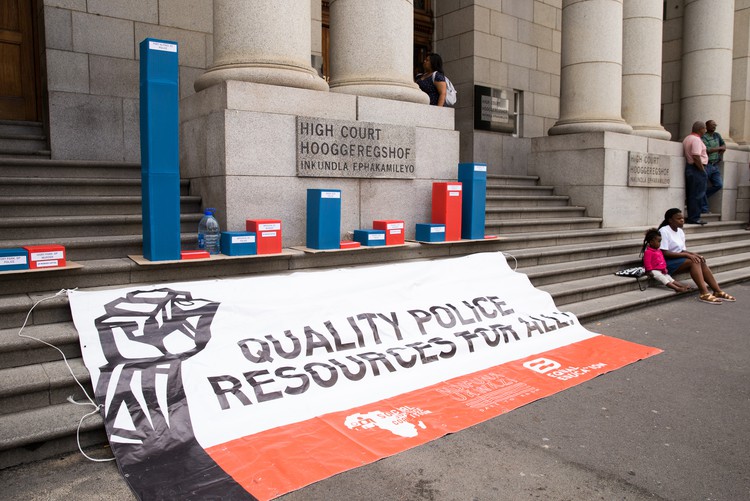
Activists from the Social Justice Coalition demonstrated outside the Equality Court in Cape Town where they have brought an application to change the way police resources are allocated. Photo: Ashraf Hendricks
1 December 2017
Advocates representing the South African Police Service (SAPS) argued in the Western Cape High Court on Thursday that the allocation of police resources in poor communities did not discriminate against race and poverty.
Advocate Thabani Masuku, for the police, said: “How does [the allocation of police] affect the rights of the people? The rights are not affected by the policy; they are affected by the fact that when people are sitting in their homes, they get robbed; they walk in the street, they get robbed. That is what directly affects the rights, not the allocation policy.”
But Judge MJ Dolamo quoted the constitution, saying that the police are meant to prevent, combat and investigate crime. The allocation of police must make sure that this constitutional imperative is met.
“If the policy does not speak to what the Constitution says, doesn’t that affect the rights of the people?” asked Dolamo.
Masuku agreed that the policy should be to prevent crime, but responded that he did not believe the allocation policy did not do so. He said, however, “the argument can be that it does so inadequately”.
“The real complaint here, as we understand, is that the entire allocation policy is unfairly discriminatory because there are adequate police services provided for richer areas. The richer areas are happy because they have more police, and the poorer areas are complaining. So, do you deal with that aspect by invalidating the allocation policy, or do you say it has to provide adequate policing in poorer areas?” asked Masuku. “You don’t invalidate because the richer areas are getting adequate police resources.”
Judge Nolwazi Boqwana alerted Masuku that this was not what the applicants were asking. The applicants were asking for discriminatory aspects of the system to be fixed.
Masuka said that even if the court should order that there be a reallocation of police resources in favour of poorer areas, it shouldn’t be based on a finding that there is unfair discrimination. “It should be based on another variable, for example there is a failure by SAPS to address policy needs in poor areas. But that’s not an unfair discrimination complaint … There is no evidence of over supply of police resources in rich areas.”
Masuku said for the kind of relief that the applicants were seeking it would have to be shown that there has been a failure in policing. If it is shown that the police are not improving policing in black areas, then the court should intervene.
He said crime should not be graded. Theft should be investigated the same way that murder would be investigated.
It was the third day in the Equality Court where civil society organisations – the Social Justice Coalition, Equal Education and the Nyanga Community Policing Forum – have asked for a declaration that the allocation of police resources in the Western Cape discriminates against black and poor people.
Speaking on the proceedings, Dalli Weyers of the SJC said, “We’re feeling good about the case we’ve made. Our senior counsel have made it very clear what we’re asking.”
“We’re simply asking that SAPS needs to be told that the effects of the current system results in discrimination on the basis of poverty and race and they need to fix that.
“We’re not telling them what to do but we simply asking the court to find that there is discrimination on those two categories. The response from SAPS so far hasn’t been strong and some of the argument was upsetting,” said Weyers.
Final arguments will be heard on 14 and 15 February 2018.